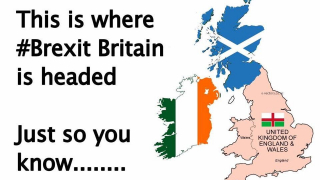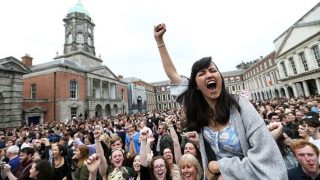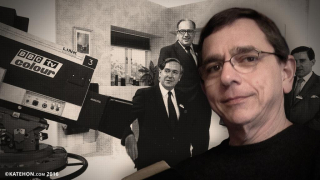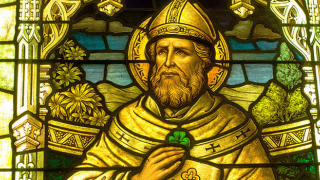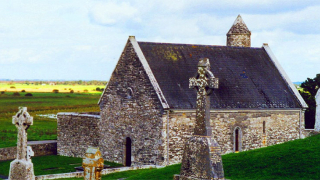Dissecting Ireland's February 2020 general election and the state of the nation
In the Republic of Ireland, among the most notable result from last week's general election outcome was a substantial rise in popularity for the left-leaning party, Sinn Féin, whose standing rose by 10.7% as they gained 15 parliamentary seats in the Dáil (Irish parliament) for a 37 seat total. As witnessed across Europe, a fall in support has occurred in Ireland pertaining to the establishment parties, Fine Gael – in power since 2011 – and Fianna Fáil, with both centre-right parties combined losing 19 seats in the election.
Fine Gael and Fianna Fáil failed to amass 50% of first preference votes between themselves, whereas in the 2007 election they garnered almost 70% of the vote. It means that, even joining forces, these two parties with 73 elected members, do not have the required seats in which to form a majority government (80 seats needed).
Licking their wounds, Fine Gael and Fianna Fáil leaders may attempt to woo the Green Party, who have a commendable focus on climate change, with the Greens gaining nine seats with a now 12 seat total, still modest enough. The three parties are entering talks this week and could formulate a "grand coalition" government in the time ahead, but it is not certain.
Fine Gael and Fianna Fáil are pointedly snubbing Sinn Féin, refusing even to negotiate with them. This shows a disregard for the 24.5% of the Irish electorate (more than half a million people) who voted for Sinn Féin candidates as a first preference, a larger percentage in comparison to those who voted for either Fine Gael (20.9%) or Fianna Fáil (22.2%).
Moreover, there is a deep-rooted fear among Fine Gael and Fianna Fáil ministers regarding the prospect of a left-of-centre party like Sinn Féin entering government, and the repercussions this could entail for them.
Still, there are indications since Mary Lou McDonald assumed leadership of Sinn Féin, in February 2018, from long-time president Gerry Adams, that the party has gradually been moving closer to the centre (1). Adams, aged 71 and from Belfast in the north of Ireland, was president of Sinn Féin for 34 years, which made him one of the world's longest serving party leaders.
Up until his departure two years ago, Adams was attacked bitterly and unfairly by the Western media and numerous mainstream figures. This was primarily due to his extensive history of radical, civil rights and front-line activism, in effect against British imperial power and its offshoots. Adams' political beliefs and his mistrust of the elite were also viewed as threats to the Irish establishment.
On 14 March 1984, Adams came close to being assassinated when he was shot in the neck, shoulder and arm by gunmen from the Ulster Defence Association (UDA), a murderous British-backed proxy group.
The attempted killing of Adams that day, along with three of his colleagues, was carried out with British Army and Intelligence complicity (2). It provides an insight into conditions on the ground at the time. Six weeks before this shooting, Adams had estimated there was a 90% chance that he would eventually be killed. He later survived further assassination attempts, including a hand grenade that was thrown into his home.
Much of these incidents have been swept under the rug. Remarkably, just five days after his shooting in 1984 Adams was walking around fully clothed and without protection, which was an example of his refusal to be intimidated. Adams admitted that British intelligence services "wanted myself and my comrades out of the way", using their loyalist proxies like the UDA to do the dirty work (as they did elsewhere).
Focusing on the election again, a significant proportion of the Irish populace could not be described as radical or left-leaning. In spite of the decline of Fine Gael and Fianna Fáil, over 40% of the electorate (almost a million people) still decided to support these parties, regardless of their harmful policies. Some of those who chose Sinn Féin did so for reasons other than leftist sympathies, but out of frustration at traditional party ineptitude and desire for change. A considerable percentage of Sinn Féin's new voters had previously supported Fine Gael or Fianna Fáil in the 2016 election.
A crucial reason that a sizable portion of the Irish public, through the generations, have remained cautious is due to the long-held presence of the Catholic Church in almost every city, town and village in Ireland. For decades, the Catholic Church has held a firm grip too on the Irish school system, which is of questionable enough quality on its own, without pupils also being indoctrinated through Roman-era Christianity, with all of its meekness and servility.
Since the 4th century AD, the Church has supported the rich and powerful practically without interruption, the opposite to what was intended by Christ and the message of the Gospels. Christianity was formerly based on a radical pacifist religion, but it was shifted from the 4th century onwards to become the religion of the Roman Empire, thereafter serving power, privilege and war in large measure. (3)
In Ireland, the influence of Catholicism has begun to wane only during the past generation, undermined by scandals and its inability to adapt to evolving beliefs; as revealed by the Church's rigid stance during the 2018 vote on whether to legalise abortion, which was passed by two-thirds of the electorate. Nevertheless, the Church retains a good deal of power in Ireland, with 36% of people still attending mass services each week and 78% identifying as Catholic.
Ireland has faced enormous challenges due to its location on the map, where it lies adjacent to Britain, which for generations until the early 1900s was one of the world's leading imperial powers. From the years 1801 to 1922, Ireland was ruled directly from London as part of "the United Kingdom of Great Britain and Ireland".
The British government had a central role in exacerbating the worst tragedy in Irish history: The Great Famine (1845-1851), which killed over a million people through either mass starvation or disease. These horrific occurrences are almost impossible to contemplate today with the society awash with food of all kinds.
The Great Famine's initial cause was a naturally occurring potato blight, which affected parts of Europe but Ireland most severely – which was mainly reliant upon a single crop, the potato, a policy engineered by London. Furthermore, the British government's capitalist economic system under prime minister John Russell, and its intentionally pitiful relief efforts, contributed greatly to the catastrophe.
The Irish population in 1840, five years before the Great Famine struck, comprised just over 8 million people. By 1850 it had dropped to 5 million, with many of those who avoided starvation and infectious diseases emigrating to America.
London had a pivotal role too in the partitioning of Ireland in 1921, which stands to the current day – along with the stoking of societal turmoil that took place in the north of Ireland, from the mid-to-late 20th century (“the Troubles”), resulting in many hundreds of deaths, hardship and sectarianism.
During this war in the north of Ireland which officially ended in 1998, the notorious British-supported loyalist paramilitaries killed almost 900 people, 85.5% of whom were civilians (4). It must be acknowledged that crimes were in fact committed on all sides, in what was a sometimes vicious conflict. At the root of this upheaval, lay the spectre of British dominance in the north of Ireland.
The Irish Republican Army (IRA), a branch of paramilitary organisations established from the early 20th century, was formed as a response to London's control over Ireland. During the IRA's existence, including that of its splinter groups, some serious misjudgments were made and occasional atrocities were committed in their war against British rule (5). However, the IRA's actions were a tiny fraction as destructive in comparison to the assaults unleashed on Ireland by British actions. The mass media, in both Britain and Ireland, have for years portrayed the IRA as the real villains when it is a long way from the truth.
Meanwhile, time advances and circumstances change. According to the UN Human Development Index (HDI) Ireland now has the 3rd best living standard on earth, even higher than Germany, Sweden and the US (6). As useful as the HDI is, it has a few flaws and does not take into account rising homelessness in Ireland, growing levels of inequality, along with drug use and gambling problems.
Regarding the fall off of support for Fine Gael and Fianna Fáil, the reasons behind it includes their support of implementation for crippling austerity measures following the recession of over a decade ago. Bank bailouts were furthermore ordered at the expense of a population left holding the bill, as many of the culprits responsible for the crash escaped without charge.
Influencing the Irish electorate also, has been the regression in health service standards and the deliberate attacks on social security which further erodes democracy, coupled with escalating rent and housing costs. It is effectively a class war that has been pursued. Overall results of this are even more severe in Europe by comparison to America. The European Union has pursued unnecessary, self-destructive actions under an autocratic and unelected troika (European Commission, European Central Bank and IMF). This in turn has destabilised the EU's very foundations.
Establishment parties are simply unwilling, or perhaps unable, to address the above crises in a country like Ireland awash with money – plenty of which is directed towards the top 10% in society. (7)
Throughout its election campaign, Sinn Féin turned their focus towards issues of immediate relevance to people, such as the health and housing calamities, reaping rich rewards for them in the voting booths. Yet Sinn Féin's strategy on climate change is far less encouraging, and they rank only slightly higher than Fine Gael and Fianna Fáil according to the assessments of climate experts, including John Sweeney, a climatologist of international renown. (8)
Just prior to voting, a paltry 3% of the Irish electorate felt Brexit to be their primary concern (9). Brexit did not feature heavily in party or media focus during the election build-up, as it was not centrally tied to key issues and is already becoming a somewhat secondary matter. More concerning, only 6% of Irish people quizzed felt climate change to be their key focus.
Lack of public awareness on climate change is at least partially as a result of endemic shortcomings in the Irish state, that is dominated to an unusual degree by a combination of multinational corporate power and EU bureaucracy, which largely controls government policy. Media coverage of climate change in Ireland has been inadequate, and is another core reason why the public are broadly unaware of how worrying the environmental issues are. (10)
Climate change poses ethical and moral questions which are hardly being answered in a satisfactory manner. Ireland continues to have one of the worst climate change records in Europe, which is inflicting reputational damage on the country, not to mention a culpability in the global climate crisis.
It is no coincidence that Ireland, an important cog in the neoliberal machine, has lagged sorely behind in its obligations to the environment. Surfacing in the 1970s as a response to 1960s popular activism, the ideology of neoliberalism – which among other things hugely increased private power and concentration of wealth – has been a decisive factor behind humanity's inability to tackle either climate change, or reduce the possibility of nuclear war. (11)
Climate change is already having dire effects on populations in Asia, Africa, and elsewhere, much of whom comprise those contributing the least to the problem. For a number of years Ireland has been producing more greenhouse gases than 400 million of the earth's poorest citizens, which is seldom reported (12).
Particularly revealing has been Ireland's contribution to the Green Climate Fund (GCF), a UN international body which was formulated in December 2010 to raise money distributed from First World countries (the highest emitters) to those less well off states in the fight against climate change. By the end of 2016, Sweden was contributing €46.65 per capita to the Green Climate Fund, Denmark €9.33, while Ireland pledged a miserable €0.53 (13). This portrays an unabashed contempt for both the environment and those suffering the most, some classic hallmarks of the neoliberal era.
Ireland constitutes the largest corporate tax haven in the world, ahead of Singapore, Switzerland and the Netherlands. Ireland's low corporation tax rate of 12.5% has been ruthlessly capitalised on, resulting in the country becoming a sanctuary for powerful and unaccountable multinationals (Google, Facebook, Apple, etc.) as is well known internationally. One of Taoiseach (prime minister) Leo Varadkar's first trips abroad was to the west coast of America in November 2017 for a "trade mission", where he promptly met executives from Microsoft, Google, Facebook and Apple.
Relating to the press, Ireland has one of the highest concentrations of media ownership of any so-called democracy, with a hefty segment of it in the hands of figures like billionaire businessman Denis O'Brien.
O'Brien enjoys relations with the powerful Clinton family. Among other things, he has donated millions of dollars to the “Bill, Hillary and Chelsea Clinton Foundation”. Donald Trump, himself a billionaire and then presidential candidate, linked O'Brien to his rival Hillary Clinton in an attempt to damage her. (14)
Notes:
1 Fiach Kelly, "McDonald's tricky first year underlines Sinn Féin's central problem", Irish Times, 9 February 2019, https://www.irishtimes.com/news/ireland/irish-news/mcdonald-s-tricky-first-year-underlines-sinn-f%C3%A9in-s-central-problem-1.3787220
2 Mark Moloney, "30 years ago: Attempted assassination of Gerry Adams by UDA", An Phoblacht, 14 March 2014, https://www.anphoblacht.com/contents/23835
3 Noam Chomsky, What We Say Goes: Conversations on U.S. Power in a Changing World (Penguin, 5 Feb. 2009), p. 85
4 Anne Cadwallader, "Explainer: British collusion in Northern Ireland's dirty war", Declassified UK - Daily Maverick, 15 January 2020, https://webcache.googleusercontent.com/search?q=cache:21nSSndjWTIJ:https://www.dailymaverick.co.za/article/2020-01-15-explainer-british-collusion-in-northern-irelands-dirty-war/+&cd=11&hl=en&ct=clnk&gl=ie
5 RTE, "Four named as Birmingham bombers at inquest", 22 March 2019, https://www.rte.ie/news/uk/2019/0322/1037973-birmingham-bomb-inquest/
6 United Nations Development Programme, "Table 1: Human Development Index and its components", Human Development Reports, http://hdr.undp.org/en/content/table-1-human-development-index-and-its-components-1
7 Irish Examiner, "Top 10% of earners take home a third of all income in 2016; bottom half earn just 20%", 22 August 2018, https://www.irishexaminer.com/breakingnews/business/10-of-earners-take-home-a-third-of-all-income-in-2016-bottom-half-earn-just-20-863867.html
8 Niall Sargent, "Bigger parties furthest off track on climate, manifesto analysis", Green News Ireland, 3 February 2020, https://greennews.ie/bigger-parties-furthest-off-track-on-climate-manifesto-analysis/
9 Pat Leahy, "Irish Times Poll: Health and housing most important issues for voters", Irish Times, 5 February 2020, https://webcache.googleusercontent.com/search?q=cache:KAA2sjgnXL8J:https://www.irishtimes.com/news/politics/irish-times-poll-health-and-housing-most-important-issues-for-voters-1.4161805+&cd=1&hl=en&ct=clnk&gl=ie
10 Seán McCárthaigh, "Irish newspaper coverage of climate change low by European standards and 'predominantly political'", TheJournal.ie, 28 November 2019, https://www.thejournal.ie/climate-change-irish-media-coverage-4909129-Nov2019/
11 Christopher Lydon, "Noam Chomsky: Neoliberalism Is Destroying Our Democracy", The Nation, 2 June 2017, http://webcache.googleusercontent.com/search?q=cache:3DK5wNPu3jMJ:https://www.thenation.com/article/archive/noam-chomsky-neoliberalism-destroying-democracy/&hl=en&gl=ie&strip=1&vwsrc=0
12 John Sweeney, "Citizens' assembly offers our final chance on climate change - We are the last generation who will be able to protect our children's legacy", Irish Times, 30 September 2017, https://www.irishtimes.com/opinion/citizens-assembly-offers-our-final-chance-on-climate-change-1.3238434
13 Dick Ahlstrom, John Sweeney, "Ireland a 'delinquent country' on climate change", Irish Times, 17 November 2016, https://webcache.googleusercontent.com/search?q=cache:uUIJWsogsgEJ:https://www.irishtimes.com/news/science/ireland-a-delinquent-country-on-climate-change-1.2872502+&cd=1&hl=en&ct=clnk&gl=ie
14 Roy Greenslade, "Donald Trump attacks Hillary Clinton over links with Denis O'Brien", The Guardian, 29 September 2016, https://www.theguardian.com/media/greenslade/2016/sep/29/donald-trump-attacks-hillary-clinton-over-links-with-denis-obrien


